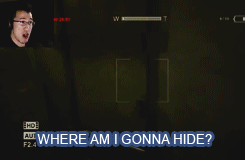I don’t need a psychology degree to tell you that social anxiety sucks. For me, social anxiety means rehearsing my words four hours before speaking to my professor at office hours and avoiding my university career center’s resources like mock job interviews to avoid looking like an idiot. Here’s the problem: We need to build social networks to establish credibility and get hired, even though it’s about as terrifying as watching The Grudge in the dark at 4 a.m. Lucky for us plagued by this social scourge, and hopefully not the vengefulness of Kayako’s grudge, there is hope.
Figure Out What Works for You

Social anxiety manifests itself differently in everyone, so don’t assume that there’s only one method to tackle the problem. “The ideal networking opportunities truly depends on the individual and how social anxiety impacts them,” said Florida State University Career Center Director Dr. Casey Dozier.
In other words, identify your triggers and work towards avoiding them. Ask yourself: What bothers me more—group settings or one-on-one conversations? If you prefer one-on-one interactions, make an appointment with your professor rather than speaking to him after class. I personally communicate better during one-on-one interactions than in front of large groups, so when I needed help decoding College Algebra, I went to my professor’s office hours. The individual attention earned me a passing grade, a new friend on LinkedIn and a killer recommendation letter.
Take Baby Steps

Recognize your limits before setting your goals. Before heading to my job interview, I small talked with a few strangers on my way to the restaurant. “While it might be tempting to make a plan to attend a new event and talk to five people, that might be a huge expectation to set if one has never attended such an event,” suggests Dr. Dozier. “A more realistic goal might be to simply attend an event. Then, the next event the goal can be to interact or talk with at least one person.”
By making it my goal to talk to a few strangers on the way rather than focusing on my interview, I remained cool, calm and collected right up to the big event. This method helped me kick butt in future interviews and excel in class discussions. Remember to set realistic goals—it’s perfectly okay not to be a social Superman. Even these small steps will give you a list of references instead of pouring over your resume at 3 a.m. furiously trying to remember the phone number of your last supervisor.
Seek Help

This may come as a surprise, but you’re definitely not alone. A bounty of resources exist to help people like us through the toughest of social dilemmas, and some of these resources may even exist on your campus. You’re not the only one who chokes up raising their hand in class or attending a welcome mixer with all of your professors.
“Identify the Counseling Center—many universities offer workshops or information about test anxiety, social anxiety and meeting new people,” said Dr. Dozier. She also suggested searching your university webpage for “social anxiety” to see what resources show up or connecting with local community resource centers or helplines for walking through strategies. Plenty of campuses also offer group therapy sessions, where you can meet other students struggling with the same issues as you and learn to work together for support. Every case of social anxiety is unique, but you can rest easy knowing someone else struggles with anxiety too and was able to conquer it once and for all.
Have an Escape Plan

Once, my Spanish professor called on me to answer a question, but I didn’t know how to pronounce the words to answer her. The very idea of humiliating myself in front of the other 23 students in the room overwhelmed me and led to me crying in the middle of class. Anxiety attacks happen, especially at the worst possible moment. So how do we handle these unpredictable situations? Try to access coping strategies through trial and error processes.
“Some examples of useful strategies might include excusing oneself to the restroom to take some deep breaths, having music on hand for relaxation, or having a plan to say “excuse me” and simply walk outside to take a break,” suggested Dr. Dozier. “Often times meeting with an individual counselor can be useful to brainstorm these strategies and identify techniques that work best for you.” In case you’re curious about the outcome of my episode, I took deep breaths, answered her question to the best of my ability (I got it wrong anyway) and quickly diverted my thoughts to my weekend plans of chilling in my pajamas with Netflix by my side. Don’t let the fear of anxiety attacks or embarrassing yourself keep you from success.
Somewhere deep inside of all of us, a strong, confident individual waits, ready to successfully manage any stressful social encounter without a blink. That individual also might have laser vision, but that’s just wishful thinking. Channel your inner strength, and you’ll find yourself with the connections you need to live out your dream job. One thing’s for sure—if I can do it, so can you.



















